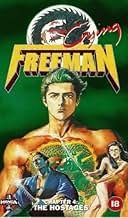CRYING FREEMAN: PORTRAIT OF A KILLER (1988) is the first volume in what was ultimately a six-part series of animated adaptations of the celebrated "Crying Freeman" manga (comic book) series written by Kazuo Koike ("Lone Wolf and Cub") and drawn by Ryoichi Ikegami ("Sanctuary"). The first part tells the story of how Yo Hinamura, a sensitive young Japanese sculptor, is forcibly enlisted by the Hong Kong-based 108 Dragons and trained and programmed to become one of their top assassins. He gets his name, Crying Freeman, from the fact that he yearns to be free despite his programming and sheds a visible stream of tears after each killing.
The core of this chapter is Freeman's relationship with a lonely young Japanese woman, Emu Hino, after she witnesses his killing of a Hong Kong crime lord. She knows Freeman is coming to eliminate her as a witness and he knows she knows it. Before he comes for her, she paints a portrait of him with his gun outstretched. When he does arrive and sees the painting, he begins the process of changing his mind about her. A real love develops between the two and eventually he has to convince the leaders of the 108 to let her join him wherever he goes. The police and the Yakuza gangs in Japan learn of her connection to Freeman and go after her as well.
The romantic elements of the story include a passionate sex scene between Freeman and Emu that falls just shy of the near-pornographic depiction of it in the manga. There are additional scenes of sex and nudity. In one, the widow of a Yakuza gang boss has sex in a funeral home closet with a corrupt police inspector during her husband's funeral.
There's quite a lot of bloodshed and killing as Freeman performs his various assassinations (generally of underworld figures) and fends off attacks by other killers out to stop him. Freeman's ability to hit his targets with dead-on accuracy with knives or bullets and his practically superhuman acrobatic skills, enabling him to leap up or down out of harm's way, give the fight scenes a slightly fantastic air that recalls Hong Kong action films in the way the act of killing is transformed into an act of performance.
Most importantly, although the anime is rendered in brilliant colors, it painstakingly captures the drama and elegance of the manga's black-and-white drawings with breathtaking accuracy. Daisuke Nishio, the director of this installment (better known for his DRAGON BALL Z films), captures the sense of time, place and mood so expertly conveyed in the manga, but also knows how to expand on the action and how to pace a scene properly for animation. The whole sequence at Emu's dark, sprawling mansion as she waits for Freeman to come after her is a masterpiece in the use of lighting, décor, closeups and staging of the characters to enhance the mood of foreboding, death, erotic passion and hope. Time and again in this 52-minute adaptation the anime captures the stark imagery and swift, violent action of the manga as beautifully as this reviewer has ever seen it done.
The "Crying Freeman" manga has also been adapted into two live-action films, CRYING FREEMAN (1995), directed by Christophe Gans (BROTHERHOOD OF THE WOLF) and starring Mark Dacascos, and a Hong Kong action film, KILLER'S ROMANCE (1990), starring Simon Yam and Joey Wang. Neither compares favorably with this first anime adaptation.
































